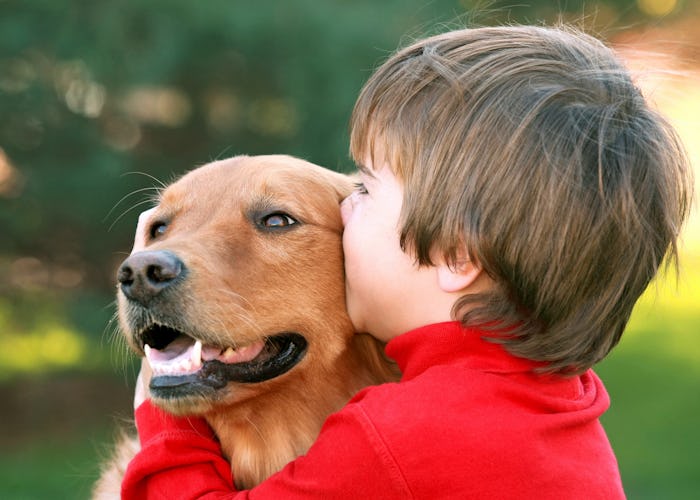Big dogs can be the absolute best. Whether you want a running companion or a big ol' couch buddy, there's so much to love about giant pooch. But when you add kids into the equation, are big dogs the right fit? It turns out, a big canine might just be the smartest thing you ever give your little human(s). Here are 4 reasons why big dogs are the best for kids, in case someone in your home needs a little convincing!
Now, I know this can be a dicey subject, since people who own small dogs will sometimes fervently defend why their particular breed is best. But if you look at the science, and yes studies have been done on this, big dogs are statistically better in three key categories, according to Psychology Today, reporting on research done at the University of Veterinary Medicine Vienna.
The study was based on statistical analysis of a 237-question survey completed by more than 1,200 dog owners in Vienna, according to Psychology Today. The findings revealed that small dogs (classified as weighing less than 44 pounds) "are seen as less obedient, more aggressive and excitable, and more anxious and fearful," than larger dogs, according to Applied Animal Behavior Science.
If you have children, the fact that bigger dogs tend to be more obedient and less aggressive and anxious is definitely a good thing! Here are four more reasons why a big dog might be best for your kiddos.
1They Need Exercise
Dogs are great exercise motivators. They demand that you walk them and keep them physically active, which in turn, keeps you active too. But big dogs might be a little better at keeping your kids on the move.
"In general, larger and working dogs have higher energy needs, and smaller/toy breeds need less exercise," according to Dr. Susan Nelson, K-State veterinarian and assistant professor of clinical sciences, in an interview with Science Daily.
Of course, it all comes down to the individual dog, but if you want to get your kids away from screens and video games, a big dog might really help with that.
2Training May Be Easier
Trying to potty train kids and teach them good manners is a struggle, so the last thing you want as a parent is a dog that it also hard to train.
While all dogs, in terms of size, are equally trainable, according to Animal Planet, there may be more things to consider when training a small dog compared to a larger pup.
"When training a Maltese or Chihuahua, you must be careful not to waste even one kibble because some of these tiny dogs only eat a quarter of a cup of food per day," said Diane Podolsky, with The Cultured Canine, in an interview with Animal Planet.
What's more, when training a small dog, you have to be careful that your larger stature doesn't intimidate them and prevent them from learning, Rover cautioned.
3You Don't Have to Worry About "Small Dog Syndrome"
We've all heard of short guys having Napoleon complexes, but it turns out that small dogs have their own version of that phenomenon.
"Small breeds are known for developing what trainers call Small Dog Syndrome (SDS). Small dogs are often allowed to exhibit undesired behaviour because it’s viewed as less of a nuisance and less dangerous than if it were displayed by their larger canine cousins," explained Modern Dog magazine.
Because smaller dogs are often allowed to "exhibit dominant behavior" more than a larger dog, a small dog may be more likely to yap, growl, and jump, according to PetCareRx.
4They May Be Smarter
There's some evidence to suggest that size matters in terms of canine intelligence.
"[We] find a statistically significant pattern of differences in Working and Obedience Intelligence showing that there is a relationship between a dog's size and its intelligence," according to Stanley Coren PhD., author of The Intelligence of Dogs: A Guide to the Thoughts, Emotions, and Inner Lives of Our Canine Companions, writing for Psychology Today.
However, it's worth noting that that the study led by Dr. Coren, in conjunction with the American Kennel Club and Canadian Kennel Club, only found a relationship in dog size and intelligence up to a certain point, since giant breed dogs (considered 85 pounds or heavier) were found to have lower intelligence scores, according to Psychology Today.
The sweet spot for intelligence was found in the medium-to-large dog groups, according to the same Psychology Today article.
So if you're on the fence of whether a small or big dog is the best match for your family, perhaps these findings will help. But really, it might just come down to making a trip to your local pound and seeing which pup you and your family connects with, whether it's a tiny Yorkie or the large, elderly Great Dane.
